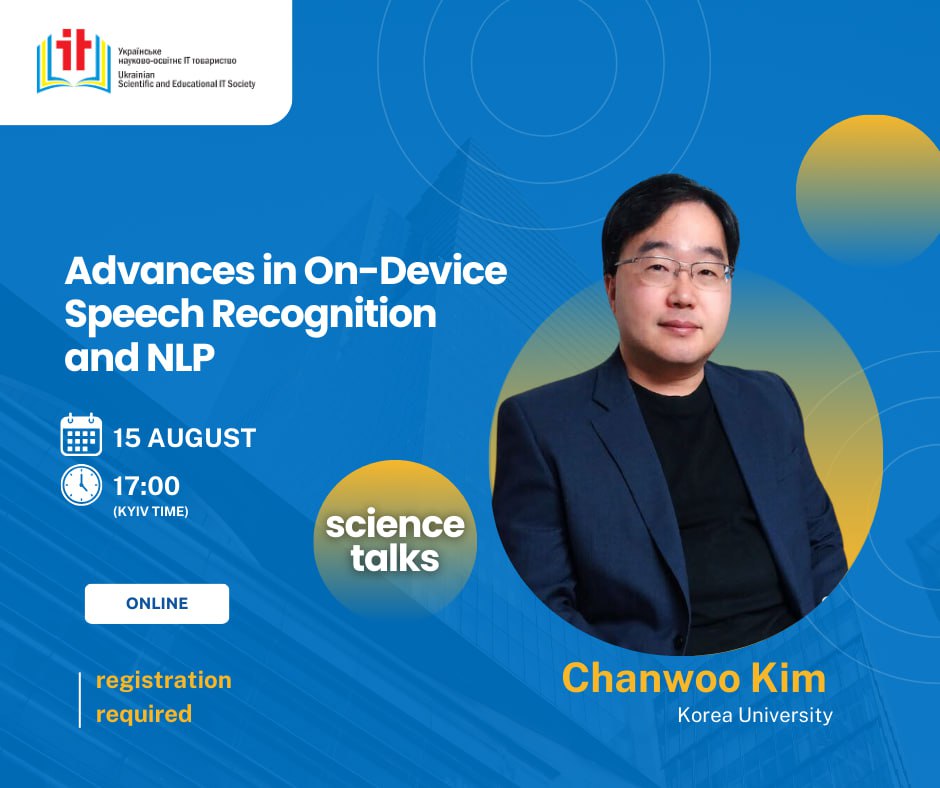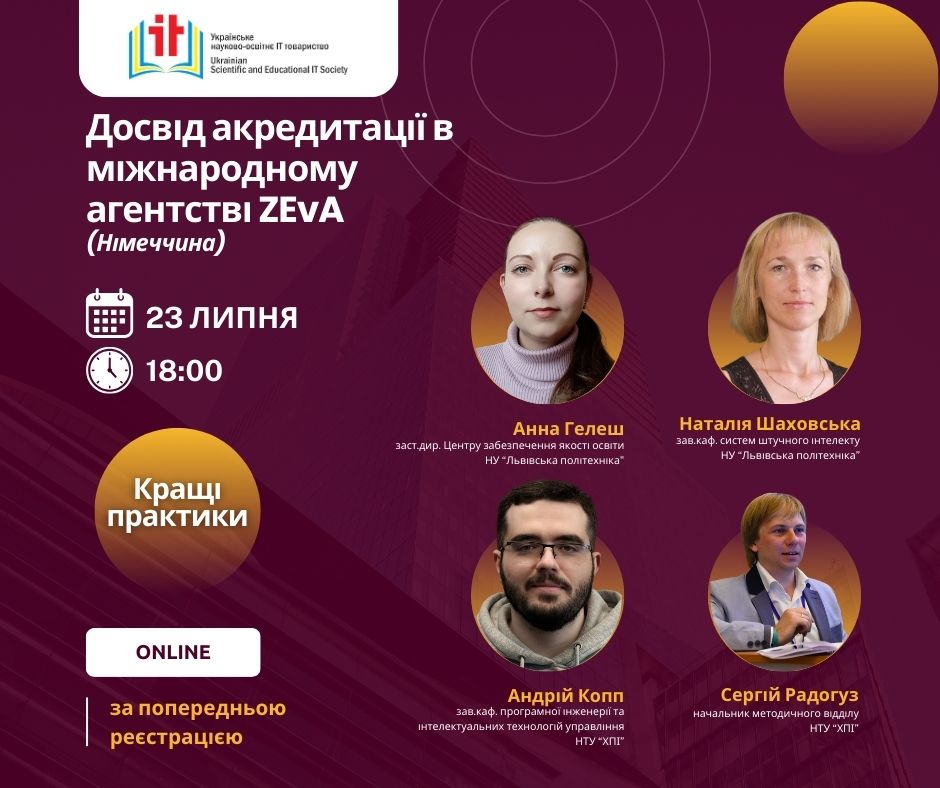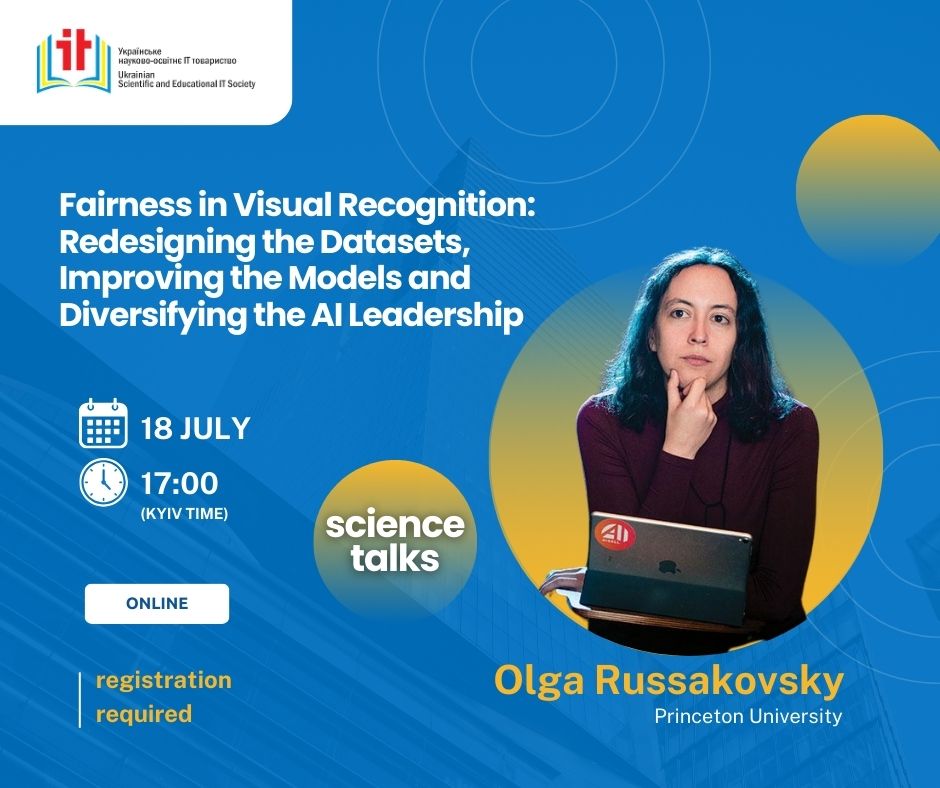************************************************************************************************************
👋 Шановні колеги!
ГО “УНІТ” запрошує долучитись до чергового наукового семінару! 🌍
🧠 Advances in On-Device Speech Recognition and Natural Language Processing
✅ Abstract: In this talk, Chanwoo Kim will give an overview of recent advances in on-device end-to-end Automatic Speech Recognition (ASR) and Natural Language Processing (NLP) algorithms, especially for commercial products. Conventional speech recognition systems based on Weighted Finite State Transducers (WFSTs) require a relatively large memory footprint, making it challenging to operate them for on-device applications for large vocabulary speech recognition tasks. Recent advances in end-to-end neural network technologies have made it possible to perform almost all speech recognition tasks on-device. On-device Natural Language Understanding (NLU) can be built using the Joint Bidirectional Encoder Representations from Transformers (BERT) approach, which classifies an user intention and identifies the slot values using a single BERT-based structure. Chanwoo will also provide an overview of how generative Language Models (LMs) can be employed for various NLU tasks. Finally, Chanwoo will describe recent research directions, such as generative speech/language multimodal approaches.
👨🏫 Bio: Chanwoo Kim is a professor at the Department of Artificial Intelligence at Korea University. Till 2023, he has been a corporate Executive Vice President (EVP) at Samsung Research leading the Language and Voice Team (LVT). He joined Samsung Research as a corporate Vice President (VP) heading the speech processing Lab in Feb. 2018. He has been leading research on end-to-end speech recognition, end-to-end text-to-speech (TTS), machine translation, Natural Language Understanding (NLU), Language Modeling (LM) and Question Answering (QA), speech enhancement, key-word spotting, and so on at Samsung Research. Most of these research outcomes have been commercialized for Samsung products. He was a senior software engineer at the Google speech team between Feb. 2013 and Feb. 2018. He worked on acoustic modeling for speech recognition systems and enhancing noise robustness using deep learning techniques. While working for Google, he contributed to data-augmentation and acoustic modeling of Google speech recognition systems. He contributed to the commercialization of various Google AI speakers and Google speech recognition systems. He was a speech scientist at Microsoft from Jan. 2011 to Jan. 2013. Dr. Kim received his Ph. D. from the Language Technologies Institute of the School of Computer Science at Carnegie Mellon University in Dec. 2010. Between 2003 and 2005 Dr. Kim was a Senior Research Engineer at LG Electronics, where he worked primarily on embedded signal processing and protocol stacks for multimedia systems.
🗓 Date: August, 15, 17:00 (Kyiv time)
📍 Format: online (Zoom + live stream at https://lnkd.in/dr8U7qkB)
✍️ Registration: https://forms.gle/gLf9NRwCdMPYa4zT6

************************************************************************************************************
👋 Dear Colleagues, we invite you to take part in ProfIT AI Workshop 2024!
🧠 International Workshop of IT-professionals on Artificial Intelligence (ProfIT AI 2024) will be held in Cambridge, MA, USA (online). The workshop is organized by Massachusetts Institute of Technology and National Aerospace University “Kharkiv Aviation Institute”. 4th International Workshop of IT professionals on Artificial Intelligence (ProfIT AI 2024) is dedicated to practical aspects of the latest research and results of international scientists and practitioners related to artificial intelligence. The workshop aims to exchange new ideas, obtain theoretical and practical results of scientific research in the field of artificial intelligence, discuss the current state of the industry, integrate efforts to introduce research results, establish creative contacts, and expand scientific ties. We believe that the workshop results will significantly contribute to the development of artificial intelligence. The workshop is supported by Ukrainian scientific and educational IT society, Kharkiv IT Cluster and Coordinating council of the National Academy of Sciences of Ukraine on Artificial Intelligence.
📚 Proceedings of the ProfIT AI 2024 shall be submitted to CEUR Workshop Proceedings for online publication, and indexed in Scopus database.
Topics of interest include, but are not limited to:
- Natural Language Processing;
- Computer Vision;
- Intelligent Systems;
- Intelligent Methods in Healthcare;
- Artificial Intelligence Ethics, Policy and Governance.
🗓 Important dates:
- 10.08.2024 Paper submission deadline
- 01.09.2024 Notification of acceptance
- 10.09.2024 Camera ready submission deadline
- 25.09.2024 Official Opening
🔗 More details: https://profitai.csail.mit.edu/

************************************************************************************************************
👍Досвід акредитації в міжнародному агентстві ZEvA (Німеччина)
Акредитація освітніх програм є актуальною темою для обговорення освітянами впродовж останніх п’яти років. Відповідно до розпорядження Кабінету Міністрів України №554-р від 10 липня 2019 (зі змінами від 28 червня 2024) українськи заклади вищої освіти можуть акредитувати свої програми не тільки в Національному агентстві із забезпечення якості вищої освіти, але й в 49 іноземних агентствах. Своїм досвідом успішної акредитації Центральним агентством з оцінювання та акредитації (Німеччина) поділяться представники Національний технічний університет “Харківський політехнічний інститут” та Львівська політехніка.
Cпікери:
✅Сергій Радогуз, к.і.н, доц., начальник методичного відділу Національного технічного університету “Харківський політехнічний інститут”
✅Андрій Копп, Ph.D., доц., завідувач кафедри програмної інженерії та інтелектуальних технологій управління Національного технічного університету “Харківський політехнічний інститут”, виконавчий директор ГО “Українське науково-освітнє ІТ товариство”
✅Анна Гелеш, к.і.н., доц., заступник директора Центру забезпечення якості освіти Національного університету “Львівська політехніка”
✅Наталія Шаховська, д.т.н., проф., завідувач кафедри систем штучного інтелекту Національного університету “Львівська політехніка”
❗️Дата: 23 липня 2024, 18:00 (Kyiv time)
❗️Формат: online ( Zoom + пряма трансляція https://www.facebook.com/po.useit )
❗️Реєстрація: https://forms.gle/jQZ91CEFrAV7Aijp6

************************************************************************************************************
🧠 Fairness in Visual Recognition: Redesigning the Datasets, Improving the Models and Diversifying the AI Leadership
Computer vision models trained on unparalleled amounts of data have revolutionized many applications. However, more and more historical societal biases are making their way into these seemingly innocuous systems. We focus our attention on two types of biases: (1) bias in the form of inappropriate correlations between protected attributes (age, gender expression, skin color, …) and the predictions of visual recognition models, as well as (2) bias in the form of unintended discrepancies in error rates of vision systems across different social, demographic or cultural groups. In this talk, we’ll dive deeper both into the technical reasons and the viable strategies for mitigating bias in computer vision.
🎓 Dr. Olga Russakovsky is an Associate Professor in the Computer Science Department at Princeton University. Her research is in computer vision, closely integrated with the fields of machine learning, human-computer interaction and fairness, accountability and transparency. She has been awarded the PAMI Young Researcher Award, the NSF CAREER award, the AnitaB.org’s Emerging Leader Abie Award in honor of Denice Denton, the CRA-WP Anita Borg Early Career Award, the MIT Technology Review’s 35-under-35 Innovator award, the PAMI Everingham Prize and the Foreign Policy Magazine’s 100 Leading Global Thinkers award. In addition to her research, she co-founded and serves as Board Chair of the AI4ALL nonprofit dedicated to increasing diversity and inclusion in Artificial Intelligence (AI). She completed her PhD at Stanford University and her postdoctoral fellowship at Carnegie Mellon University.
✅ Date: July, 18, 17:00 (Kyiv time)
✅ Format: online (Zoom + live stream at «Українське науково-освітнє ІТ товариство»)
✅ Registration: https://forms.gle/p3NdMBCoLmtg4nAM7

************************************************************************************************************
Запрошуємо на черговий науковий семінар з лауреатом премії Т’юрінга професором Гарварду Леслі Валіантом
🧠Topic: The Importance of Being Educable: A New Theory of Human Uniqueness
📓Abstract: In this visionary talk, Leslie Valiant argues that understanding the nature of our own educability is crucial to safeguarding our future. After breaking down how we process information to learn and apply knowledge, and drawing comparisons with other animals and AI systems, he explains why education should be humankind’s central preoccupation. Will the unique capability that has been so foundational to our achievements and civilization continue to drive our progress, or will we fall victim to our vulnerabilities? If we want to play to our species’ great strength and protect our collective future, we must better understand and prioritize the vital importance of being educable.
🎓Bio: Leslie Valiant was educated at King’s College, Cambridge; Imperial College, London; and at Warwick University where he received his Ph.D. in computer science in 1974. He is currently T. Jefferson Coolidge Professor of Computer Science and Applied Mathematics in the School of Engineering and Applied Sciences at Harvard University, where he has taught since 1982. Before coming to Harvard he had taught at Carnegie Mellon University, Leeds University, and the University of Edinburgh. His work has ranged over several areas of theoretical computer science, particularly complexity theory, learning, and parallel computation. He also has interests in computational neuroscience, evolution and artificial intelligence and is the author of two books, Circuits of the Mind, and Probably Approximately Correct. He received the Nevanlinna Prize at the International Congress of Mathematicians in 1986, the Knuth Award in 1997, the European Association for Theoretical Computer Science EATCS Award in 2008, and the 2010 A. M. Turing Award. He is a Fellow of the Royal Society (London) and a member of the National Academy of Sciences (USA).
✅Date: June, 19, 17:00 (Kyiv time)
✅Format: online (Zoom)
✅Registration: https://forms.gle/xXtTBddeoiPPddNp9
************************************************************************************************************
🎓 Громадська організація “Українське науково-освітнє ІТ товариство” розпочала серію наукових семінарів з всесвітньо відомими дослідниками. Перший захід з дослідницею ШІ Мелані Мітчелл відбувся 24 квітня!
🧠 Topic: The Debate Over “Understanding” in AI’s Large Language Models
Дивіться відео з семінару та дискусію на нашому YouTube ▶️ https://www.youtube.com/watch?v=IRC1VUKy5aQ
📃 Abstract: Prof. Mitchell will survey a current, heated debate in the AI research community on whether large pre-trained language models can be said to “understand” language—and the physical and social situations language encodes—in any important sense. She will describe arguments that have been made for and against such understanding, and, more generally, will discuss what methods can be used to fairly evaluate understanding and intelligence in AI systems. Mitchell will conclude with key questions for the broader sciences of intelligence that have arisen in light of these discussions.
👩🏫 Bio: Melanie Mitchell is a Professor at the Santa Fe Institute. Her current research focuses on conceptual abstraction, analogy-making, and visual recognition in artificial intelligence systems. Melanie is the author or editor of six books and numerous scholarly papers in the fields of artificial intelligence, cognitive science, and complex systems. Her book Complexity: A Guided Tour (Oxford University Press) won the 2010 Phi Beta Kappa Science Book Award and was named by Amazon as one of the ten best science books of 2009. Her latest book is Artificial Intelligence: A Guide for Thinking Humans (Farrar, Straus, and Giroux).
Долучайтесь до ГО “УНІТ” та слідкуйте за нашими подіями!
✅ Для вступу до Організації запрошуємо ознайомитись із Процедурою набуття членства за посиланням (https://usit.eu.org/membership-procedure). Ця сторінка також містить перелік дійсних членів Організації.
📧 Звернутися із запитаннями щодо діяльності Організації та процедури прийому нових членів можна на електронну адресу Організації (pouseit@gmail.com).
📩 https://t.me/USITSociety
😎 https://www.facebook.com/po.useit/
🕊 https://www.instagram.com/po.useit/
🔗 https://www.linkedin.com/company/pouseit/
📹 https://www.youtube.com/@pouseit/
🌐 https://usit.eu.org/